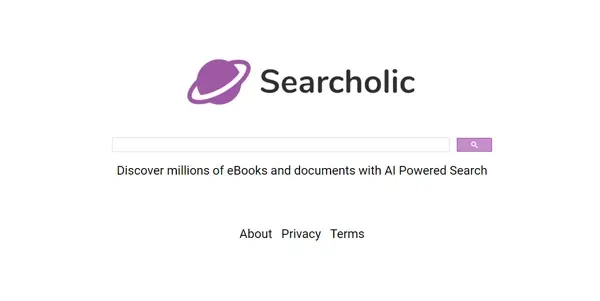Searcholic

Search millions of e-books and documents (including academic papers) from an AI-powered search engine
Searcholic: An AI-Powered Search Engine for E-books and Documents
Searcholic is a free, AI-powered search engine designed to access and analyze millions of e-books and documents, including academic papers. Unlike traditional search engines that primarily index web pages, Searcholic focuses on providing comprehensive access to a vast library of textual information, leveraging AI to enhance search accuracy and efficiency. This makes it a powerful tool for researchers, students, and anyone needing in-depth information from a wide range of sources.
What Searcholic Does
Searcholic's core function is to allow users to quickly and effectively search through a massive index of e-books and documents. Its AI capabilities go beyond simple keyword matching; the engine understands context, semantic relationships, and even nuanced phrasing to deliver more relevant results. This means users can find information even if they don't know the exact keywords or terminology used in the source material.
Main Features and Benefits
- AI-Powered Search: Searcholic employs advanced AI algorithms to understand the meaning and context of search queries, significantly improving search accuracy and recall.
- Vast Document Index: The engine indexes millions of e-books and documents, including scholarly articles, offering unparalleled breadth of information.
- Intuitive Interface: A user-friendly interface allows for easy navigation and search refinement.
- Contextual Understanding: Searcholic goes beyond keyword matching, understanding the semantic relationships between words and concepts.
- Free Access: The service is currently available completely free of charge.
Use Cases and Applications
Searcholic has numerous applications across various fields:
- Academic Research: Students and researchers can utilize Searcholic to efficiently find relevant academic papers, books, and other scholarly materials, accelerating the research process.
- Literature Reviews: Quickly gather comprehensive information for literature reviews across a variety of topics.
- Due Diligence: Professionals can use Searcholic to conduct in-depth research for projects requiring extensive background information.
- Content Creation: Writers and journalists can leverage the platform to find supporting data and relevant information for their articles and publications.
- Self-Learning: Individuals can use Searcholic to explore various topics and expand their knowledge base.
Comparison to Similar Tools
While several other platforms offer document search capabilities, Searcholic distinguishes itself through its:
- AI-driven precision: Many alternative solutions rely on simpler keyword-matching algorithms, leading to less accurate results compared to Searcholic's AI-powered search.
- Comprehensive index of e-books: While some platforms may focus primarily on academic papers, Searcholic includes a wide range of e-books, broadening its scope considerably.
- Free access: Unlike many competitors that offer limited free access or require subscription fees, Searcholic remains completely free, making it highly accessible.
Direct competitors are difficult to pinpoint without more information about the specific scope of Searcholic's indexed documents. However, a comparison could be made against platforms like Google Scholar (focusing on academic papers) or specialized research databases depending on the overlap in the content indexed.
Pricing Information
Searcholic is currently offered completely free of charge. There are no subscription fees or paywalls hindering access to its extensive document library.
Conclusion
Searcholic presents a valuable resource for anyone needing to conduct in-depth research across a vast collection of e-books and documents. Its AI-powered search capabilities and free access make it a compelling alternative to other, often more expensive, research tools. However, its future development and the long-term sustainability of its free model remain to be seen. Users should keep in mind the limitations inherent in any large-scale indexing system and the potential for inaccuracies or incomplete data.